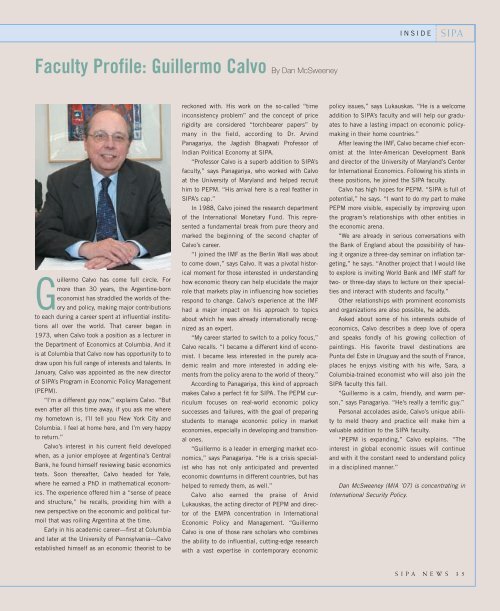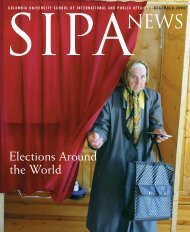The Energy Issue - School of International and Public Affairs ...
The Energy Issue - School of International and Public Affairs ...
The Energy Issue - School of International and Public Affairs ...
Create successful ePaper yourself
Turn your PDF publications into a flip-book with our unique Google optimized e-Paper software.
INSIDE<br />
SIPA<br />
Faculty Pr<strong>of</strong>ile: Guillermo Calvo By Dan McSweeney<br />
Guillermo Calvo has come full circle. For<br />
more than 30 years, the Argentine-born<br />
economist has straddled the worlds <strong>of</strong> theory<br />
<strong>and</strong> policy, making major contributions<br />
to each during a career spent at influential institutions<br />
all over the world. That career began in<br />
1973, when Calvo took a position as a lecturer in<br />
the Department <strong>of</strong> Economics at Columbia. And it<br />
is at Columbia that Calvo now has opportunity to to<br />
draw upon his full range <strong>of</strong> interests <strong>and</strong> talents. In<br />
January, Calvo was appointed as the new director<br />
<strong>of</strong> SIPA’s Program in Economic Policy Management<br />
(PEPM).<br />
“I’m a different guy now,” explains Calvo. “But<br />
even after all this time away, if you ask me where<br />
my hometown is, I’ll tell you New York City <strong>and</strong><br />
Columbia. I feel at home here, <strong>and</strong> I’m very happy<br />
to return.”<br />
Calvo’s interest in his current field developed<br />
when, as a junior employee at Argentina’s Central<br />
Bank, he found himself reviewing basic economics<br />
texts. Soon thereafter, Calvo headed for Yale,<br />
where he earned a PhD in mathematical economics.<br />
<strong>The</strong> experience <strong>of</strong>fered him a “sense <strong>of</strong> peace<br />
<strong>and</strong> structure,” he recalls, providing him with a<br />
new perspective on the economic <strong>and</strong> political turmoil<br />
that was roiling Argentina at the time.<br />
Early in his academic career—first at Columbia<br />
<strong>and</strong> later at the University <strong>of</strong> Pennsylvania—Calvo<br />
established himself as an economic theorist to be<br />
reckoned with. His work on the so-called “time<br />
inconsistency problem” <strong>and</strong> the concept <strong>of</strong> price<br />
rigidity are considered “torchbearer papers” by<br />
many in the field, according to Dr. Arvind<br />
Panagariya, the Jagdish Bhagwati Pr<strong>of</strong>essor <strong>of</strong><br />
Indian Political Economy at SIPA.<br />
“Pr<strong>of</strong>essor Calvo is a superb addition to SIPA’s<br />
faculty,” says Panagariya, who worked with Calvo<br />
at the University <strong>of</strong> Maryl<strong>and</strong> <strong>and</strong> helped recruit<br />
him to PEPM. “His arrival here is a real feather in<br />
SIPA’s cap.”<br />
In 1988, Calvo joined the research department<br />
<strong>of</strong> the <strong>International</strong> Monetary Fund. This represented<br />
a fundamental break from pure theory <strong>and</strong><br />
marked the beginning <strong>of</strong> the second chapter <strong>of</strong><br />
Calvo’s career.<br />
“I joined the IMF as the Berlin Wall was about<br />
to come down,” says Calvo. It was a pivotal historical<br />
moment for those interested in underst<strong>and</strong>ing<br />
how economic theory can help elucidate the major<br />
role that markets play in influencing how societies<br />
respond to change. Calvo’s experience at the IMF<br />
had a major impact on his approach to topics<br />
about which he was already internationally recognized<br />
as an expert.<br />
“My career started to switch to a policy focus,”<br />
Calvo recalls. “I became a different kind <strong>of</strong> economist.<br />
I became less interested in the purely academic<br />
realm <strong>and</strong> more interested in adding elements<br />
from the policy arena to the world <strong>of</strong> theory.”<br />
According to Panagariya, this kind <strong>of</strong> approach<br />
makes Calvo a perfect fit for SIPA. <strong>The</strong> PEPM curriculum<br />
focuses on real-world economic policy<br />
successes <strong>and</strong> failures, with the goal <strong>of</strong> preparing<br />
students to manage economic policy in market<br />
economies, especially in developing <strong>and</strong> transitional<br />
ones.<br />
“Guillermo is a leader in emerging market economics,”<br />
says Panagariya. “He is a crisis specialist<br />
who has not only anticipated <strong>and</strong> prevented<br />
economic downturns in different countries, but has<br />
helped to remedy them, as well.”<br />
Calvo also earned the praise <strong>of</strong> Arvid<br />
Lukauskas, the acting director <strong>of</strong> PEPM <strong>and</strong> director<br />
<strong>of</strong> the EMPA concentration in <strong>International</strong><br />
Economic Policy <strong>and</strong> Management. “Guillermo<br />
Calvo is one <strong>of</strong> those rare scholars who combines<br />
the ability to do influential, cutting-edge research<br />
with a vast expertise in contemporary economic<br />
policy issues,” says Lukauskas. “He is a welcome<br />
addition to SIPA’s faculty <strong>and</strong> will help our graduates<br />
to have a lasting impact on economic policymaking<br />
in their home countries.”<br />
After leaving the IMF, Calvo became chief economist<br />
at the Inter-American Development Bank<br />
<strong>and</strong> director <strong>of</strong> the University <strong>of</strong> Maryl<strong>and</strong>’s Center<br />
for <strong>International</strong> Economics. Following his stints in<br />
these positions, he joined the SIPA faculty.<br />
Calvo has high hopes for PEPM. “SIPA is full <strong>of</strong><br />
potential,” he says. “I want to do my part to make<br />
PEPM more visible, especially by improving upon<br />
the program’s relationships with other entities in<br />
the economic arena.<br />
“We are already in serious conversations with<br />
the Bank <strong>of</strong> Engl<strong>and</strong> about the possibility <strong>of</strong> having<br />
it organize a three-day seminar on inflation targeting,”<br />
he says. “Another project that I would like<br />
to explore is inviting World Bank <strong>and</strong> IMF staff for<br />
two- or three-day stays to lecture on their specialties<br />
<strong>and</strong> interact with students <strong>and</strong> faculty.”<br />
Other relationships with prominent economists<br />
<strong>and</strong> organizations are also possible, he adds.<br />
Asked about some <strong>of</strong> his interests outside <strong>of</strong><br />
economics, Calvo describes a deep love <strong>of</strong> opera<br />
<strong>and</strong> speaks fondly <strong>of</strong> his growing collection <strong>of</strong><br />
paintings. His favorite travel destinations are<br />
Punta del Este in Uruguay <strong>and</strong> the south <strong>of</strong> France,<br />
places he enjoys visiting with his wife, Sara, a<br />
Columbia-trained economist who will also join the<br />
SIPA faculty this fall.<br />
“Guillermo is a calm, friendly, <strong>and</strong> warm person,”<br />
says Panagariya. “He’s really a terrific guy.”<br />
Personal accolades aside, Calvo’s unique ability<br />
to meld theory <strong>and</strong> practice will make him a<br />
valuable addition to the SIPA faculty.<br />
“PEPM is exp<strong>and</strong>ing,” Calvo explains. “<strong>The</strong><br />
interest in global economic issues will continue<br />
<strong>and</strong> with it the constant need to underst<strong>and</strong> policy<br />
in a disciplined manner.”<br />
Dan McSweeney (MIA ’07) is concentrating in<br />
<strong>International</strong> Security Policy.<br />
SIPA NEWS 35

















